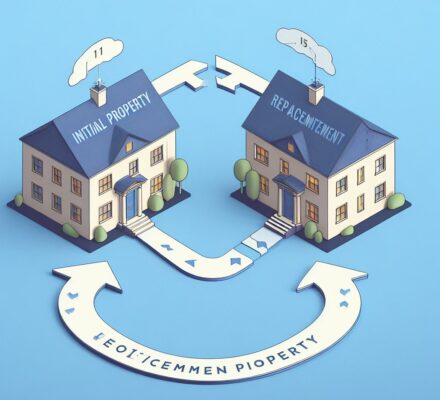So you think you can avoid paying taxes on your gains from a 1031 exchange? Think again!
In this article, we’ll delve into the key tax implications of 1031 exchange gain non-recognition.
From eligible properties to deferral of capital gains taxes, we’ll cover all the important details you need to know.
Don’t let the allure of tax savings blindside you – read on to navigate the potential pitfalls and consequences of this tax strategy.
Key Takeaways
- Eligible properties for a 1031 exchange must be used for trade, business, or investment purposes, and personal properties like primary residences or vacation homes do not qualify.
- The like-kind requirement means that the replacement property must be of a similar nature or character to the property being exchanged.
- The 1031 exchange allows for the deferral of capital gains taxes by reinvesting the proceeds from the sale of a property into a like-kind property.
- There are time constraints and deadlines that need to be followed, including a 45-day identification period and a 180-day exchange period from the sale of the relinquished property. Failure to comply with these deadlines can result in the loss of tax deferral benefits.
Eligible Properties for 1031 Exchange
To qualify for a 1031 exchange, you must identify eligible properties that meet the criteria set by the IRS. This means that not all properties can be included in a 1031 exchange.
The IRS has specific requirements that the replacement property must meet in order to be considered eligible. First, the property must be used for productive use in a trade or business, or for investment purposes. This means that properties used for personal purposes, such as a primary residence or vacation home, don’t qualify.
Additionally, the replacement property must be of like-kind to the property being exchanged. Like-kind refers to the nature or character of the property, rather than its grade or quality. For example, you can exchange a commercial property for another commercial property, or a residential rental property for another residential rental property.
The IRS does allow for some flexibility in determining like-kind, so it’s important to consult with a tax professional to ensure your exchange meets the requirements.
Deferral of Capital Gains Taxes
You can defer capital gains taxes through a 1031 exchange. This tax strategy allows you to reinvest the proceeds from the sale of a property into a like-kind property, thereby deferring the capital gains taxes that would otherwise be due.
Here are some key points to consider when it comes to deferring capital gains taxes through a 1031 exchange:
- Like-Kind Requirement: The property you acquire through the exchange must be of like-kind to the property you sold. This means that both properties must be used for investment or business purposes, and they must be of the same nature or character.
- Qualified Intermediary: To facilitate the exchange, you must work with a qualified intermediary who’ll hold the proceeds from the sale of your property and use them to acquire the replacement property. This ensures that you don’t have actual or constructive receipt of the funds, which is necessary for the tax deferral.
- Identification and Timing: You must identify the replacement property within 45 days of the sale of your property and complete the exchange within 180 days. Failure to meet these deadlines could result in disqualification of the exchange and the immediate recognition of capital gains taxes.
- Basis and Depreciation: The basis of the replacement property is adjusted based on the deferred gain from the sale of the original property. Additionally, any depreciation taken on the original property may carry over to the replacement property, which can provide additional tax benefits.
Time Constraints and Deadlines
Meeting the time constraints and deadlines is crucial for successfully executing a 1031 exchange and deferring capital gains taxes. As a taxpayer, it is important to understand the specific timeframes associated with this tax-deferral strategy to ensure compliance and maximize the benefits. The following table outlines the key time constraints and deadlines involved in a 1031 exchange:
| Time Constraint/Deadline | Description |
|---|---|
| Identification Period | Within 45 calendar days of selling the relinquished property, the taxpayer must identify potential replacement properties. This period is strict and cannot be extended or modified. |
| Exchange Period | The taxpayer must acquire the replacement property within 180 calendar days from the date of selling the relinquished property. This period includes the 45-day identification period. |
| Reporting Requirements | The taxpayer must file IRS Form 8824 with their tax return for the year in which the exchange occurred, regardless of whether or not they recognized any gain. Failure to report the 1031 exchange can result in penalties and potential loss of tax deferral benefits. |
Identification and Replacement Property Rules
During the identification and replacement property rules, it’s essential for taxpayers to carefully select potential replacement properties within the specified time frame. These rules play a crucial role in the 1031 exchange process, as they determine whether the transaction qualifies for tax deferral.
Here are four key points to consider when navigating the identification and replacement property rules:
- Timeframe: Taxpayers have 45 days from the closing of the relinquished property sale to identify potential replacement properties. This deadline is strict and can’t be extended, so it’s important to act promptly.
- Identification Rules: The IRS allows taxpayers to identify up to three potential replacement properties, regardless of their value. Alternatively, taxpayers can identify more than three properties, as long as the total fair market value doesn’t exceed 200% of the relinquished property’s value.
- Replacement Property Requirements: To qualify as a replacement property, it must be of like-kind to the relinquished property. This means that both properties must be held for investment or use in a trade or business.
- Acquisition Deadline: Taxpayers must acquire one or more of the identified replacement properties within 180 days of the sale of the relinquished property. Failure to meet this deadline will result in the recognition of the gain and potential tax liabilities.
Understanding and adhering to these identification and replacement property rules is crucial for taxpayers seeking to successfully complete a 1031 exchange and defer their tax obligations.
Potential Tax Consequences Upon Sale of Replacement Property
Upon sale of the replacement property, there are potential tax consequences that you need to be aware of. While a 1031 exchange allows you to defer the recognition of gain, it doesn’t eliminate your tax liability altogether. When you eventually sell the replacement property, any gain not recognized in the exchange will be subject to taxation.
The tax consequences upon sale of the replacement property will depend on various factors, such as the holding period and the nature of the property. If you sell the property within a certain timeframe, known as the ‘holding period requirement,’ your gain may be subject to recapture. This means that the portion of the gain that was previously deferred through the 1031 exchange will be taxed at ordinary income rates.
Additionally, if the replacement property was acquired with debt, you may also face potential tax consequences upon sale. The debt that was used to acquire the property could result in taxable income known as ‘boot.’ Boot is any non-like-kind property received or the relief of debt. This additional income could trigger a taxable event and should be taken into consideration when calculating your tax liability.
It is crucial to consult with a tax professional to fully understand the potential tax consequences upon sale of the replacement property. They can provide you with guidance tailored to your specific situation and help you navigate the complexities of the tax code to minimize your tax liability.
Frequently Asked Questions
Can Personal Residences Be Eligible for a 1031 Exchange?
No, personal residences are not eligible for a 1031 exchange. The 1031 exchange allows for the exchange of like-kind properties used for business or investment purposes, not personal residences.
Are There Any Exceptions to the Time Constraints and Deadlines for Completing a 1031 Exchange?
There are no exceptions to the time constraints and deadlines for completing a 1031 exchange. It is important to follow the guidelines and ensure that the exchange is completed within the specified timeframe.
What Happens if I Identify Replacement Properties but Fail to Acquire Any of Them Within the Specified Time Frame?
If you identify replacement properties but fail to acquire any within the specified time frame, you may not be able to complete the 1031 exchange. This could result in the recognition of gain and the need to pay taxes.
Are There Any Specific Rules or Restrictions on the Types of Properties That Can Be Considered as Replacement Properties?
There are specific rules and restrictions on the types of properties that can be considered as replacement properties. These rules ensure that the properties are like-kind and meet certain criteria to qualify for a 1031 exchange.
Are There Any Circumstances Where I Might Still Be Liable for Paying Capital Gains Taxes Even After Completing a 1031 Exchange?
You completed the 1031 exchange, but watch out! There are circumstances where you might still owe capital gains taxes. Be aware of specific situations that could trigger tax liability after the exchange.




